ALEXANDER THE GREAT
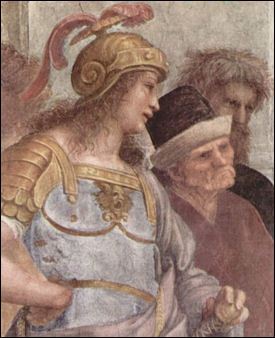
Raphael's AlexanderAlexander III of Macedon---Alexander the Great (356 to 324 B.C.)---was perhaps the greatest conqueror of all time. In 334 B.C., at the age of 21, he left the small Greek of Kingdom of Macedonia with 43,000 foot soldiers and 6,000 horsemen to seek revenge against the Persian empire, which had sacked Greece and Macedonia and burnt Athens a century before, and didn't stop until he conquered much of the known world at that time. [Sources: Richard Covington, Smithsonian magazine, November 2004; Caroline Alexander, National Geographic, March 2000; Helen and Frank Schreider, National Geographic, January 1968. [↔]
During his 13-year march of conquest Alexander claimed a territory that stretched as far east as India and China, and included present-day Turkey, Lebanon, Israel, Jordan, Egypt, Libya, Cyprus, Greece, Iraq, Iran, Afghanistan, Uzbekistan, Turkmenistan, Tajikistan, Kyrgyzstan and Pakistan. The same territory would extend from California to Bermuda if it were placed on a map over the United States.
Julius Caesar, Napoleon, Dwight D. Eisenhower, the poet John Dryden and Sigmund Freud were among those who canonized Alexander as a romantic hero. St. Augustine and Dante were among those who vilified him as murderer and plunderer. Historians are equally divided. Some see him as a charismatic leader with a bold vision to unite East and West. Others see him as an ancient Cortez, Hitler or Stalin intent on gobbling up as much territory as he could and if cruel means were need to realize that aim then so be it. Other still see him as man of his times---brutal at times, yes, but within what was acceptable in his era---who opened up the world by bringing the West to the East.
Alexander lives on in soap and cigarette ads, the lyrics for a heavy metal song by Iron Maiden, a luxury suite at a Donald Trump hotel and a tattoo on the arm of Greek-Australian tennis player Mark Philippousssis. The mere suggestion that Alexander may be from Macedonia rather than Greece is enough to set offer a major international dispute that required the country of Macedonia to change its name.
Sources, Books and Films About Alexander the Great
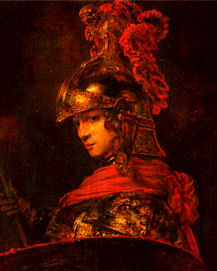
Rembrandt's AlexanderNone of Alexander's actual words were recorded verbatim. Although there were several eyewitness accounts of Alexander's campaigns they survive only in fragments written down decades or centuries after his death. Plutarch wrote his biography in the 1st century A.D. The best ancient source on his military campaigns was written by the historian Arian in the 2nd century B.C. Many of the things written about Alexander were written with pro-Alexander or anti-Alexander agendas in mind and thus sometimes it is difficult to sort out fact from fiction and get at the bottom of what really happened.
Frank Holt, an authority of Alexander the Great at the University of Houston, estimates that more than 2,000 books and articles have been written about Alexander in the last 50 years. As of 2005 there were are 700 books in print related to Alexander.
Books: Alexander the Great by Robin Lane Fox (Penguin, 1970s); Alexander the Great by Nick Sekinda and John Warry: Alexander of Macedon by Peter Green; Alexander the Conquerorby Laura Foreman (De Capo) is short on text and insightful scholarship but is rich in illustrations and color photographs. Alexander the Great: The Hunt of a New Past by Paul Cartledge, a historian at Cambridge University.
Film: Alexander the Great directed by Oliver Stone with Colin Farrell as Alexander, Angela Jolie as his mother, Van Kilmer as his father, Christopher Plummer as Aristotle and Anthony Hopkins as Ptolemy. The $150 million film was released in late 2004 got terrible reviews and was colossal flop. Baz Luhrmann ( Strictly Ballroom and Moulin Rouge ) was supposed to make an Alexander film but scrapped the idea. Ilya Salkin (producer of Superman ) plans to release Young Alexander in 2010. Alexander the Great , made in 1956 by Robert Rossen, featured Richard Burton in the lead role in a silly wig. He made his entrance with a dead lion dropped over one shoulder. It too was also a flop.
Video: In the Footsteps of Alexander the Great (May Vision, Maryland Public Television, the BBC).
Philip II, Alexander's Father
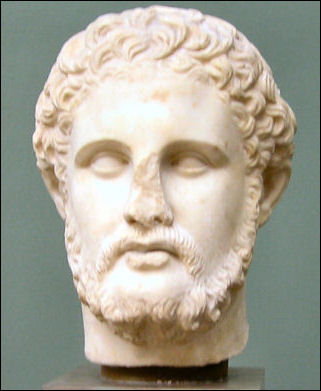
Philip II of Macedonia.Philip II, Alexander the Great's father, was the King of Macedonia and Olympias. He became king of Macedon in 359 B.C. at about the age of 23 and ruled for 23 years. An adept warrior, strategist and warrior, he transformed Macedonia from a loose confederation of tribes and cities into a powerful kingdom and introduced an agile cavalry and long pikes to warfare as he overhauled his army.
Philip II was blinded by an enemy's arrow and was lamed in a battle. He enjoyed wine, lavish feasts and women. He had at least seven wives. Like many upper class Greek men, Philip was also reportedly a bisexual. He showed great courage in battle, was a shrewd politician and patronized the arts, filling his court with writers, artists, philosophers and actors.
Rise of Macedon Under Philip II
Most of Philip's tenure as king was spent consolidating his empire in Macedonia and extending it southward into Greece. He forged his kingdom by winning crucial battles and forming important alliances through his marriages. He increased the wealth and status through trade and diplomacy at a time when Macedonia was regarded by other Greek city states such as Athens and Thebes as a barbarian territory even though the Macedonians spoke Greek and considered themselves Greeks.
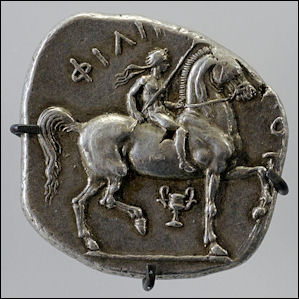 Philip II took control of Thrace and Thessaly and declared war on Athens and Thebes and their allies. In August 338 B.C., at the Battle of Chaeronea, Macedonia defeated Athens and Philip became the de facto ruler of Greece. He never conquered Athens but formed an alliance with the city after the battle.
Philip II took control of Thrace and Thessaly and declared war on Athens and Thebes and their allies. In August 338 B.C., at the Battle of Chaeronea, Macedonia defeated Athens and Philip became the de facto ruler of Greece. He never conquered Athens but formed an alliance with the city after the battle.
Philip II's ambition after the victory was to attack Persia, the arch enemy of Greece. In 336 B.C. he began a campaign against the Persians by sending an advance of 10,000 men to Asia Minor. He wasn't with the army because he had to be at the wedding one of his daughters.
At the wedding Philip II was fatally stabbed through the heart as he entered the outdoor theater where the wedding was held by a disaffected bodyguard and perhaps former lover. Some believed that Alexander may have been involved in the murder but most historians believe that was unlikely. It seems more likely that his estranged forth wife Olympias egged on the bodyguard to kill Philip because she was upset over being recently rejected in favor of a younger wife.
Tomb of Philip II
In November 1977, Dr. Manolis Andronicos, an archaeologist at the University of Thessalonika unearthed a tomb under a mound in Vergina (40 kilometers west of Thessalonika, Greece) that is believe belonged to Philip II or Philip III. [Source: Manolis Andronicos, National Geographic, July 1978]
No inscription or definitive proof was found that linked the tomb to Philip II. Evidence that kinked the tomb to him included the discovery in the tomb of an ivory head thought to be a likeness of Philip and a diadem associated with Macedonian royalty, different size leg armor (possibly an accommodation to Philip II's bad leg), the high value of the objects and the dating of the objects to the time of Philip II reign. Evidence that refutes the claim are tooth remains usually associated with a man in his 30s (Philip II was 46 when he died).
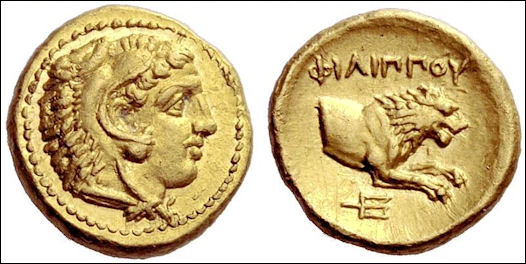
Philip II of Macedonia Gold Half Stater
The tomb was very deep (23 feet under the ground), presumably to foil grave robbers. It was a barrel- vaulted structure with extraordinary Greek wall paintings with images of Pluto, god of the Underworld , abducting Persephone and a hunting scene with five horsemen with dogs and three hunters with spears pursuing wild boar and lions. These images unfortunately faded after they were exposed to sunlight and air.
Among the he objects found in the tomb were a marble sarcophagus, a large golden casket, a gold larnax (small casket) with a Macedonian star that contained cremated remains, a royal wreath of golden acorns and oak leaves, a gold-and-silver diadem, a golden quiver, purple fabric thread with gold, a perforated bronze lantern, weapons, silver vessels, bronze vessels, bronze armor, an iron helmet, a sword, scepter, sandals, a shield," spear points, javelins, golden lion heads, and sculpture, possibly of Alexander the Great.
About 450 tombs dating to the 6th century B.C. have been found at a site called Archontiko in the Macedonian part of northern Greece. Archaeologists Pavlos and Anastasia Chrysostomou, of the Greek Ministry of Culture, say they have found scores of warriors buried with armor, swords, shields adorned with gold and silver as well as noble women with gold, silver amber and faience. These give clues to the rich warrior culture was thriving two centuries before Alexander's birth.
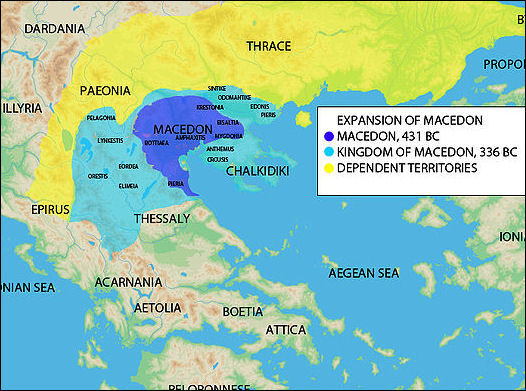
Expansion of Macedon
Alexander the Great's Early Life
Alexander was born in Pella, near the Aegean coast, on July 20, 356 B.C. to Philip II's forth wife Olmypias. He was taught warfare by his father, King Phillip II of Macedonia, religion by his mother Olympias and morality by Aristotle. His childhood was tough. He endured meals with little food and long marches. He excelled at everything he did, hung out with hard-drinking soldiers, horsemen and hunters and was inspired by Homer's tales.
When Alexander was twelve he mounted a wild horse that no one could break, causing Alexander's father to remark, "O my son, look out for a kingdom worthy of thyself, for Macedonia is not large enough to hold you." According to one story Alexander broke the horse after figuring out it reared when it saw its own shadow. Before he mounted him he calmly stroked the horse and pointed him towards the sun so he couldn't see his shadow. The horse, Bucephalas, was with Alexander on his march of conquest. When Bucephalas died at the age of 30 of battle wounds sustained fighting an elephant-mounted army in Pakistan he was given a royal funeral.
The crucial phase of the Battle of Chaeronea was led by 18-year-old Alexander and his elite Companion cavalry unit. They found a break in the enemy line and went straight after the legendary crack Thebes unit, the Sacred Band, who had a reputation for fighting to the death of the last man and were buried, according to their code of honor, in a mass grave underneath a monumental lion.

Aristotle and Alexander the Great
Alexander took the throne in 336 B.C. at the age of 20 after his father was assassinated. Alexander quickly secured the throne by murdering and exiling a number of rivals and put down anti-Macedonian revolts. Within a year he secured a kingdom that stretched from the Danube in the north and the Adriatic to the west. After a revolt in Thebes was put down he slaughtered or sold into slavery 30,000 citizens, and razed the city except for its temples and the house of the revered poet Pindar. After this Athens and other Greek city-states---with the exception of Sparta---pledged an allegiance to the young king. They also promised to provide soldiers and financial support for an invasion of Persia.
Aristotle and Alexander the Great
In 342 B.C., Philip II of Macedonia hired Aristotle to teach science and politics to his 13-year-old son Alexander the Great. Little is known about what transpired between the two. Neither Aristotle nor Alexander the Great had much to say about the other afterwards and neither seem to have much influence on the other.
One of the few things that Aristotle was recorded as saying was: “the young man is not a proper audience for political science. He has no experience of life, and because he still follows his emotions, he will only listen to purpose, uselessly." Aristotle appears to have written some pamphlets especially for Alexander. They include On Kingship , In Praise of Colones and The Glory of Rices.
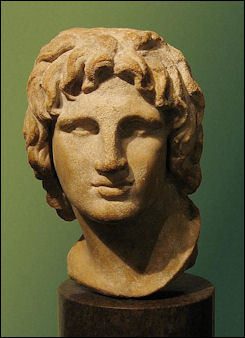
Alexander bustThe reason Philip chose Aristotle to be Alexander's teacher is not clear. Aristotle was not a well known philosopher at that time. His father served as court physician for Philip's father (Alexander's grandfather) and perhaps Philips choice was a political move aimed at rebuilding Stagira. Aristotle spent three years with Alexander, until he was 16, when he was made a regent while his father Philip was in Asia Minor.
Aristotle was well paid. Philip also helped Aristotle in his studies of nature by assigning gamekeepers to tag wild animals for him. After Alexander became king of Macedonia he gave Aristotle a lot of money so he could set up a school. While he was in Macedonia, Aristotle made friends with the general Antipater, who ran Macedonia while Alexander was on his campaign of conquest. The friendship was close enough that Antipater was the executor of Aristotle's will. Aristotle no doubt received some financial assistance from him as well.
Alexander had a deep love for Greek literature. He reportedly loved to recite passages from the plays of Euripides from memory. Plutarch wrote: "He regarded the Iliad as a handbook of the art of war and took with him on his campaigns a text annotated by Aristotle, which he always kept under his pillow together with a dagger." In the end Alexander proved more open minded than Aristotle, who tended to view non-Greeks as barbarians.
Alexander's Appearance and Image
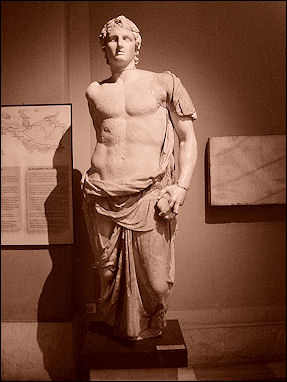 Macedonia, half-Greek, half-Barbarian, Alexander claimed he was a descendant of Zeus, Hercules and Achilles and saw himself as the Pharaoh of Egypt, the King of Babylon, the Emperor of Persia and the King of Asia.
Macedonia, half-Greek, half-Barbarian, Alexander claimed he was a descendant of Zeus, Hercules and Achilles and saw himself as the Pharaoh of Egypt, the King of Babylon, the Emperor of Persia and the King of Asia.
Like Napoleon, according to some accounts, Alexander was short, perhaps just slightly over five feet. He reportedly was stocky, muscular, with a prominent forehead, and ruddy complexion and was said to be extremely handsome with “a certain melting look in his eye." Most accounts give him curly, shoulder-length blonde hair and fair skin, according to Plutarch, with a "ruddy tinge...especially upon his face and chest." Alexander reportedly was unable to grow a beard and made it fashionable to go clean shaven.
In his lifetime, Alexander allowed his portrait to be made by three artists: the famous sculptor Lysippos; the acclaimed painter Apellas; and a gem cutter named Pyrogoteles. None of the originals exist although a few copies of Lysippos work remain. These copies as well as mosaics from Pella and Naples, depict a good looking man with blonde hair, big round eyes, no beard, and hair parted in the middle and hanging slightly over the ears. The likeness of Alexander on tetradrachma coins is thought to be accurate except of the horns of divinity.
Plutarch, who wrote Alexander's biography in the 1st century A.D., wrote Alexander tilted his head slightly to one side and was the source of the "melting look" comment. This description is consistent with a rare eye condition called Brown's syndrome. If Alexander in fact had this condition he tilted his head to see the world straight.
Alexander the Great's Personal and Family Life
.jpg)
BucephalusAlexander was very close to his mother, Olympias, a princess from Epirus in northwest Greece. She was proud, strong-willed, superstitious, and religious. She boasted she was a member of the orgiastic, ecstatic Dionysus cult that specialized in handling snakes.
Olympias could also be quite ruthless. After Phillip died she killed Philip's last wife Eurydice, and Eurydice's baby daughter, Europa “by dragging them over a bronze vessel filled with fire." Olympia is thought to have spoiled Alexander royally and he idolized here in return. As for his father, Peter Green, a classic professor at the University of Texas, told Smithsonian magazine that Alexander and Philip II had a love-hate relationship marked by “an ambivalent blend of genuine admiration and underlying competitiveness."
Richard Covington wrote in Smithsonian magazine, “From his father Alexander is believed to have inherited courage, quickness of decision and intellectual perceptiveness. His mother, who may have tried to turn their son against his father, gave him a will stronger than Philip’s, as well as fervent religiosity."
Although he was married twice some historians claim Alexander was a homosexual who was in love with his childhood friend, closest companion and general---Hephaestion. Another lover was a Persian eunuch named Bagoas. But many say that his truest love was his horse Bucephalas.
On his march of conquest, Alexander became entranced with a Songdian princess named Roxanne after she was captured in a siege of a Sogdian fortress. Arrian described her as “the loveliest woman in Asia after Darius's wife. Her married her in 327 B.C., apparently for love but also to give his presence in Asia some legitimacy. Alexander's second wife was a daughter of his arch-enemy Darius.
Alexander fathered a son with Roxanne, and perhaps another one with his Persian mistress, but sex didn't seem to have been a big part of his life. He once reportedly said, “Sex and sleep alone make me conscious that I am mortal." Roxanne died in 311. His son Alexander IV died in 310.
Alexander the Great's Character
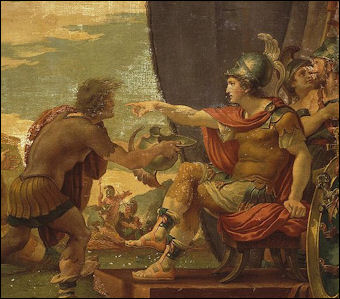
Alexander the Great
refuses to take waterRichard Covington wrote in Smithsonian magazine, “Despite his imperialist accomplishments Alexander has always seemed a melancholy figure, possessed by what ancient Greeks called pothos , a passionate yearning...He was a military genius and a hero to his men. He never asked them to do something he would not have done himself, and he bore the wounds to prove it. He also shared his vast riches with his men. When he challenged his army to take the most difficult route, to do the impossible, they amazed themselves when they succeeded."
Oliver Stone, director of the awful Alexander film, told Smithsonian magazine, “He was the Sun God, the star of all time, Joe Dimaggio, Mickey Mantle rolled into one. Some historians put him...in a class with Genghis Khan and Attila the Hun, but they miss the point. No tyrant ever gave back so much. His life was not about money for himself, but about his growing curiosity, engaging and fulfilling his intellect, his consciousness...These days we have a strong antipathy for conquerors, but in Alexander's time, war was a way of life and soldiering a much more honorable profession."
Young Alexander was very competitive and ambitious. When Alexander heard of one Phillip's victories he muttered to himself, "My father will be the first to everything. For me he will leave no great or brilliant action." Once when court philosopher Aanxarchue described the infinite number of worlds in the universe to him, Alexander broke down crying, “There are so many worlds and I have not yet conquered even one."
Alexander was very religious. He reportedly stopped at all the major temples on his conquest route and made daily sacrifices to the gods. He had been raised to believe he descended from Achilles and Hercules. He had a deep respect for Zeus. Alexander was also a notorious drunk. He is said to have died after coming down with a fever after drunken escapade. Based on other descriptions some think he was an epileptic.
Image Sources: Wikimedia Commons, The Louvre, The British Museum
Text Sources: New York Times, Washington Post, Los Angeles Times, Times of London, Yomiuri Shimbun, The Guardian, National Geographic, The New Yorker, Time, Newsweek, Reuters, AP, Lonely Planet Guides, Compton's Encyclopedia and various books and other publications. Most of the information about Greco-Roman science, geography, medicine, time, sculpture and drama was taken from "The Discoverers" [∞] and "The Creators" [μ]" by Daniel Boorstin. Most of the information about Greek everyday life was taken from a book entitled "Greek and Roman Life" by Ian Jenkins from the British Museum [||].
No comments:
Post a Comment